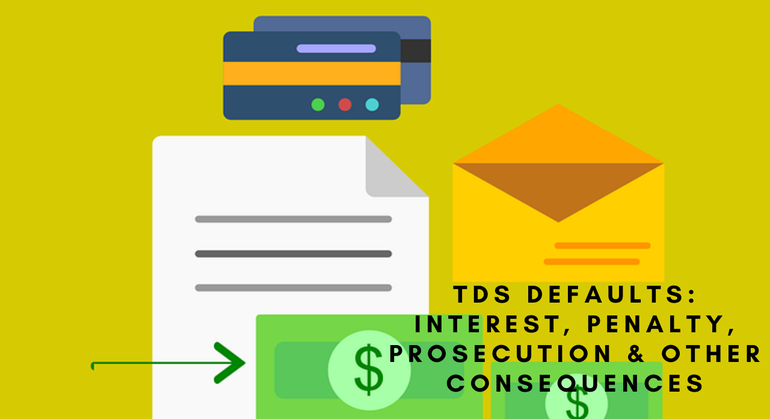

TDS Defaults: Interest, Penalty, Prosecution & Other Consequences
TDS compliance is one of the important compliances in the current scenario. Many of the taxpayers are not as compliant and hence they need to face its adverse consequences, penalty or prosecution as per case to case basis. Hence today in this article we are Penalty, prosecution, and adverse compliances faced by the assessee in default in case of TDS compliance.
- Section 201(1A)- Interest on failure to deduct tax and interest on failure to deposit deducted tax amount
- Fail to deduct TDS – 1% from the due date of deduction till the date of deduction
- Fail to Deposit TDS – 1 .5% from the date of deduction till the date of payment
- Section 220(2)-Interest on failure to pay the amount demanded u/s 156 issued by way of notice of demand
- 1% from the due date of payment of demand (due date for payment of demand shall be 30 days from the date of notice of demand)
Late Fee under section 234E
The Deductor or the Collector would be liable to pay a late fee for non-filing / late filing of TDS / TCS returns as per provisions of section 234E of the Income Tax Act.
In case of default in filing of TDS / TCS return, a late fee of Rs 200 per day is payable by the defaulter till the default continues. However, the maximum of late fees cannot exceed the amount of tax-deductible (TDS) or collectible (TCS), as the case may be.
It is important to note that the provisions of section 234E of the Income Tax Act clearly states that in case of delay, the applicable late fee is to be paid before filing of the delayed TDS or TCS return.
Penalty
- Section 271C: Penalty for failure to deduct tax at source
- Failure to deduct the whole or any part of the tax—
- As required under the provisions of Chapter XVIIB, or
- As required under section 115-O(2) or
- As per second proviso to section 194B
- The penalty of the sum equal to the amount of tax that was required to be deducted or paid shall be payable. Any penalty imposable shall be imposed by the Joint Commissioner.
- Section 271H: Penalty for failure to furnish the statements
- A person shall be liable to pay penalty, if
- He fails to deliver a statement within the time prescribed in section 200(3)
- He fails to deliver a statement within the time prescribed in section 200(3) or
- Furnishes incorrect information in the statement which is required to be delivered
- The penalty payable shall be a sum which shall not be less than Rs. 10,000 but which may extend to Rs. 1,00,000
- Section 272A(2)(g) – Penalty for failure to furnish a certificate
- If any person fails to furnish a certificate as required by section 203 (i.e. Form 16 or Form 16A) he shall be liable to pay a sum of Rs.100 for every day during which the failure continues.
Prosecution under section 276B: Failure to pay tax to the credit of Central Government under Chapter XII-D or XVII-B
If a person deducts tax at source etc. but fails to pay the same to the credit of Central Government as prescribed, he can be sentenced to rigorous imprisonment for a term not less than 3 months and extendable upon 7 years with fine as well.
Other Consequences of TDS Default
- Non-allowance of expenditure u/s 40(a)(ia)
- Failure to deduct tax on interest, commission, brokerage, rent, royalty or professional fees, etc.
- Having deducted, failure to pay the tax deducted within the dates prescribed or before the due date of filing the return of income u/s 139(1), results in disallowance of expenditure
- If tax is deducted & paid in the subsequent year, or paid after the end of the previous year but after the due date of return u/s 139(1) then the expenditure is deductible in that year.



